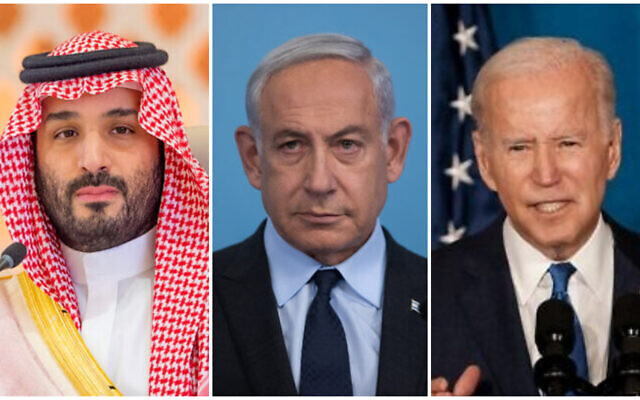



The Times of Israel is liveblogging Monday’s events as they unfold.
US said to believe Iran could attack Israel within next 24 to 48 hours
US Secretary of State Antony Blinken told counterparts from G7 countries that Washington believes an Iranian attack on Israel could begin within the next 24 to 48 hours, Axios reports, citing sources briefed on the call.
According to the report, Blinken spoke with his counterparts amid efforts by the US to de-escalate tensions in the region and prevent the eruption of an all-out war.
As the US believes an Iranian attack is inevitable after the killing of top Hezbollah and Hamas officials last week, Blinken told the officials on the call that pressuring Tehran to limit its assault is the best way to avoid regional war.
Blinken said that the US doesn’t know the exact timing of the planned Iranian attack, Axios adds, but believes it could start as early as Monday.
IDF: Officer and soldier moderately wounded in Hezbollah rocket strike near Ayelet HaShahar
An IDF officer and soldier were moderately wounded in a rocket strike launched by Hezbollah at an area near Ayelet HaShahar in northern Israel a short while ago, the military says.
The two have been taken to the hospital for treatment and their families have been informed, it adds.
The IDF says that firefighters are working to extinguish a fire that broke out in the area as a result of the rockets.
Drone sirens activated in communities close to the Lebanon border
Rocket sirens sound in the northern community of Yir’on, close to the Lebanon border.
They were preceded minutes earlier by suspected drone infiltration alerts in a number of areas along the northern border, including in Kiryat Shmona.
Shortly after the drone sirens were activated, the IDF said that the incident which triggered the alarms was over, and did not elaborate further.
Report: Netanyahu has decided not to seek normalization with Saudi Arabia before US elections

Prime Minister Benjamin Netanyahu has decided not to pursue potential normalization with Saudi Arabia before the US presidential election in November, Channel 12 reports.
It says Netanyahu made the decision at the same time as the fast-moving US political developments, with the consideration that it might be worth waiting to see whether Republican nominee and former president Donald Trump is elected.
The report says the decision has major implications, including for a potential hostage-ceasefire deal, since potential normalization would have constituted a “safety net” for Netanyahu: if his right-wing coalition were to collapse during disagreements over a Gaza deal, normalization with Saudi Arabia would have given him an election-boosting trump card and the opportunity to secure a historic legacy.
The unsourced report comes barely a week after an Israeli official told reporters in a briefing in Washington, DC that a normalization agreement between Israel and Saudi Arabia was still possible before the November presidential election, and that Netanyahu discussed the matter with US President Joe Biden during their White House meeting.
Jordan’s FM urges end to escalation after meeting Iranian counterpart in Tehran

DUBAI, United Arab Emirates — Jordan’s Foreign Minister Ayman Safadi concludes a rare visit to Iran with a plea for an end to the escalation of violence and for the region to be able to live in “peace, security and stability.”
Safadi’s visit to Iran follows continued diplomatic contacts by the United States and its partners, including France, Britain, Italy, and Egypt, to prevent further regional escalation following the assassination of Hamas leader Ismail Haniyeh in Tehran.
Iran and Jordan are also seeking to improve their relations following recent tensions related to Amman accusing pro-Iranian militias in Syria of smuggling narcotics into the country, and its taking part in the interception of Iran’s first-ever direct attack on Israel last April.
“My visit to Iran is to consult on the serious escalation in the region and to engage in a frank and clear discussion about overcoming the differences between the two countries with honesty and transparency,” Safadi says at a press conference in Tehran alongside his Iranian counterpart.
“Jordan has always been proactive in defending the Palestinian cause and the rights of the Palestinian people. It has condemned the Israeli occupation of the Palestinian territories and rejected all of Israel’s escalating measures that prevent achieving security, stability, and a just peace,” he says.
“We demand effective action to stop the Israeli aggression on Gaza, to halt such illegal Israeli measures, and to prevent crimes against the Palestinian people, in order to protect the entire region from the consequences of a regional war that would have a devastating impact on everyone,” he states.
“We want our region to live in peace, security, and stability, and we want the escalation to end.”
